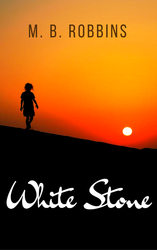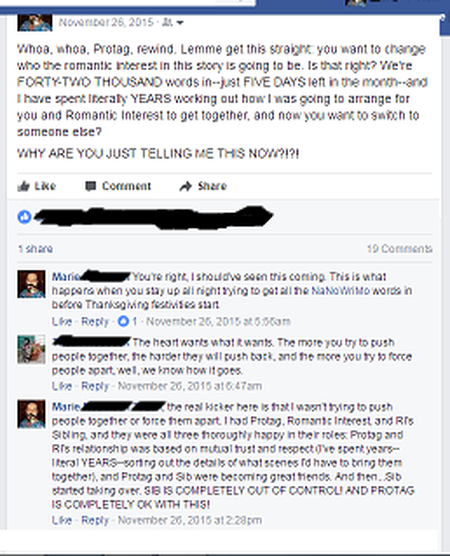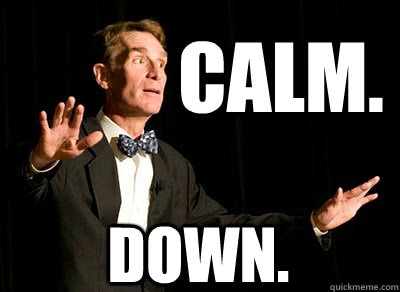|
April 1 was White Stone's first anniversary of being out in the world, so I'm a little bit late for reflecting on my first year of indie publishing*, but that's mostly because I didn't think about doing this until, like, yesterday, because that's how I do. :) Happy (Slightly-Belated) Birthday, Kalima! This past year has taught me a lot, not the least of which is redefining what success is to me. Here's the thing: I am not successful. I like to pretend otherwise because calling myself a author makes me happy, but like most indie authors, the last year has brought in a handful of sales and not even enough money to pay off a parking ticket. But that's okay. 2016 was never about selling books and making money; 2016 was about getting out of my own way, overcoming the fear that has kept me from putting my words out there since college when I first started seriously thinking about publication. 2016 was about proving to myself that I could do it. And I did it. I published. I overcame the fear and insecurity that has kept me from putting my work out there my whole life. And that means I was successful. *Technically, April 1, 2016, was not my debut. Walls was released on Feb. 28, 2016, the day I called my "soft launch," with the story I was using to test out Pronoun as a platform. I don't talk about Walls much, because it's short and not nearly as good as the White Stone series, but it still deserves a little love, so...my love to Walls. Sorry you're so overlooked. :)
0 Comments
I want to talk a little about publication today, and I feel like I need to start with something particular, something that most writers with ambitions to publish still feel: traditional publication with an agent and a publishing house and all is better. There's still a touch of stigma, a scent of low-quality or "vanity publishing," with the idea of self-publishing. I get that. I feel that. I grew up in a time when self-publishing was vanity publishing. Shit, I even almost fell for the vanity publishing thing in college. (It was the company then named Publish America, now America Star Books, which is notorious across the Internet for being a scam. Fortunately for me, I found out about their bad reputation before signing anything with them.) That was then, when Facebook was restricted to people with .edu emails, and I had a new cell phone that ohmigod you guys, takes pictures! This is now. Here's the cool thing about self-publishing and the ultimate reason I decided to go down its path: you don't need permission to put your words into the world. In traditional publishing, there's this funny catch-22 that you have to get an agent in order to be published, and in order to get an agent, you have to be published*. (I've found this little conundrum to be true about applying for jobs and renting apartments, too, by the way. It's very annoying and probably why first-time job/apartment seekers end up in shitty places.) But self-publishing doesn't trap you in that conundrum, and after years of dealing with that kind of vicious cycle in other aspects of my life, I didn't want to fight with it in my writing. I wanted to, as Sean Platt and Johnny B. Truant's book says, Write. Publish. Repeat. Things began to click in 2015. I bumped in to the books by Joanna Penn and the guys at Sterling & Stone (of the above-mentioned Write. Publish. Repeat.) Pronoun was a sponsor of NaNoWriMo that year, which is how I found out about it, and its user-friendly and completely free platform for creating and distributing ebooks continues to be the best thing since my discovery of Scrivener (which I also found because it was a NaNo sponsor. Hmm, I think I'm sensing a pattern...) Canva and Pixabay made designing graphics fun, and viola! I am now an indie author. *Not always all the time, of course, or there'd be no such thing as traditional publishing. But you get it. I'm generalizing to make a point.
NOTE: I'm going to attempt to write this post without spoilers for Wide Horizons or anything else, but no promises that I won't slip. I get kind of excited when I talk about writing. :) November 26, 2015. Somewhere around 4 am. It's the wee hours of Thanksgiving morning, and I've been up all night getting in as many NaNoWriMo words as I can before the Thanksgiving family stuff starts later that morning. I just finished a crucial scene in Wide Horizons (2015's NaNo novel) and am attempting to rest on my laurels for a moment. And then, things go off the rails.
It wasn't the first time I've lost control of my own fictional characters (Will from Walls did have that moment where he rode, unplanned, into the story and announced he was going to be one of the main characters, and Sam turned Nixie from what was going to be a straight-up retelling of Grimm's "The Nixie of the Mill-Pond" into a story about growing up and childhood friendships), but it was to date the most dramatic, and it sent me reeling. I didn't set out to make Wide Horizons the story it ended up being, and the characters involved in the story's romantic subplot surprised me. But after I finished throwing my Thanksgiving day hissy fit about "Sibling" usurping the role of romantic interest, getting a good night's sleep, and thinking through the implications of this new direction, I realized that it was going to be all right. Bill Nye said it was going to be OK, so it must be true! More than all right, in fact: I had tripped on the perfect way to tie the story's romantic subplot into the series' overarching themes about faith and free will. This was an unexpected revelation for the entire White Stone series, and it has led me to a conclusion I probably should've had years ago.
Losing control of your characters isn't a bad thing. It can be alarming (see above Facebook post), but it can often lead to something you'd never thought about before. After you stop panicking about what the change is going to mean for everything for the rest of forever, you often find the direction the characters are trying to go really is the right one. (Not always. Pazur from White Stone once thought it'd be a good idea to make a sexual pass at Kalima. That was not the right direction to go, now was it, Pazur?) (I'm still a little salty about losing the argument I had with him about that scene, and I still like to remind him that I told him so every once in a while.) So go ahead. Lose control of your characters. It might be the best thing that could happen to your story! *Please note: This post is full of spoilers*
This Valentine’s Day, enamored men and women everywhere will exchange flowers and chocolate, eat romantic candle-lit dinners—and perhaps, at some point, the mood will be right for the gentleman to get down on one knee and pop The Question. There are a million right ways to ask your lady to marry you, from sky-writing above a football stadium to sitting on the couch eating burritos. But, for every right way, there is also a wrong way. So, this Valentine’s Day, here are my Top 5 Ways Not to Propose to Your Lady. 5. Murphy’s Law Bernard to Miss Bianca Disney’s The Rescuers Down Under Unlike the others on this list, Bernard’s trouble is not with a lousy setup or a poor word choice. In fact, he planned a very pleasant, traditional proposal: a romantic dinner at a nice restaurant, a diamond ring, and a few choice words about love. But then everything that can go wrong, does. He spends the entire movie trying to propose to his lady and always getting interrupted, sometimes even by Miss Bianca herself. Pesky plot, always getting in the way. Miss Bianca’s (eventual) Answer: Yes Lesson Learned: Don’t answer your cell phone at the dinner table. 4. The Compromise Edward Cullen to Isabella Swan Stephenie Meyer’s Twilight Saga Girls, is the glittery vampire of your dreams refusing to have sex with you? Vampires, is the freesia-scented girl of your dreams too lusty for her own good? Never fear, marriage is here! With a single ceremony, vampires can temper teenage hormones, and girls can get laid by marble gods! Bella’s Answer: Yes, with one condition Lesson Learned: If at first you don’t succeed, bribe, bribe again. 3. Psych! Edward Fairfax Rochester to Jane Eyre Charlotte Brontë’s Jane Eyre The scene starts off with Jane and Mr. Rochester discussing his imminent marriage to the honorable Miss Blanche Ingram and how, because of it, Jane is about to move from England to Ireland. It ends with Jane and Mr. Rochester engaged. I’m sorry, did I miss something? Jane’s Answer: Yes Lesson Learned: Um...I'm not sure. 2. The Cold, Hard Truth Fitzwilliam Darcy to Elizabeth Bennet Jane Austen’s Pride and Prejudice Elizabeth Bennet and Mr. Darcy are widely considered one of the most perfect romantic couples in all of fiction, but they certainly didn’t start that way, and never is that more clear than the (first) time he proposes to her. “My social class, my family reputation, and even my own better judgment abhor the thought of you. Marry me anyway.” Charlotte Lu from The Lizzie Bennet Diaries said it best: that guy really needs to work on his game. Lizzy’s Answer: Not in a million years! Lesson Learned: Maybe honesty isn’t always the best policy. 1. The Mandate of Heaven St. John Rivers to Jane Eyre Charlotte Brontë’s Jane Eyre Wait a minute. Last time I looked, Jane was engaged to Mr. Rochester. So who’s this St. John guy? OK...Jane’s Big Day gets interrupted with the discovery that all those weird things that’ve happened at Thornfield (the fire, the stabbing, the strange noises, the bone-chilling laughs) are the result of the crazy wife Mr. Rochester keeps hidden in the attic, which makes him almost a bigamist, which Jane can’t handle, so she runs away where she’s taken in by St. John Rivers, who is later revealed to be her cousin, a self-proclaimed “cold, hard, ambitious man” who is determined to go to India as a missionary. *and breathe* St. John wants Jane to accompany him to India because he thinks her diligence and intelligence would make her a good lady-missionary, but she doesn’t really want to leave England, especially because she hasn’t heard a single word from or about Mr. Rochester since the night she sneaked out of Thornfield and she’s worried that his wild, headlong nature has led him to harm since she broke his heart, but she still is willing to consider St. John’s offer because of the whole crazy-wife-in-the-attic thing, so she sort of agrees, EXCEPT...he has a condition: he insists that she marry him first, not because they love each other—a fact he pounds in with a sledgehammer—but because God Himself has declared she must. If she refuses, he says, it isn’t him she’s refusing, but GOD. *and breathe* Jane, honey, your spunk, intelligence, and moral uprightness make you my all-time favorite heroine. “I must keep in good health and not die” as your plan for avoiding hell is one of the best lines ever written. In a world inundated with girls who let their romantic others walk all over them, your ability to hold your own against Mr. Rochester even when he’s in A Mood is such a breath of fresh air. But, seriously, girl, what the heck is with these proposal scenes? Jane’s Answer: No Lesson Learned: “Ordained by God” isn’t a great reason for getting married. |
Archives
May 2018
CategoriesAll Beauty And The Beast Book Reviews Books Characters Cliche Disney Disney Reframed Editing Film Theory Frozen Goals Independent Publishing Jane Eyre Literature Movie Review Movies Overcoming Fear Pride And Prejudice Proposal Publishing Revision Romance Scam Self Publishing Self-publishing Success The Diary Twilight Valentines Day White Stone Series Wide Horizons Writer Beware Writing Writing Advice Writing Life Ya Ya Tropes |
Site last updated 06/28/24
© COPYRIGHT 2024. ALL RIGHTS RESERVED.
© COPYRIGHT 2024. ALL RIGHTS RESERVED.



 RSS Feed
RSS Feed